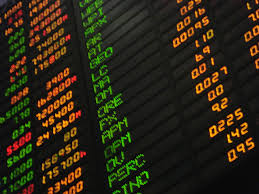
BEIJING (AP) — Shares in big state companies soared Monday after promises of government action to halt a slide in Chinese stock prices but many others sank as jittery small investors tried to cut their losses.
The market benchmark closed up 2.4 percent but still was down 27 percent from its June 12 peak. That came after a group of 21 state-owned brokerages pledged Saturday to buy stocks. On Sunday, the central bank promised more credit to finance trading. Regulators have reduced the number of planned share sales to ease fears of a glut.
Shares of some state companies including PetroChina Ltd., Asia’s biggest oil producer, and China’s four major state-owned commercial banks rose by close to 10 percent. Trading of almost 900 other companies – out of a total of 2,802 on exchanges in Shanghai and the southern city of Shenzhen – fell by the maximum 10 percent daily limit permitted by regulators, according to the financial news website Hexun.com.
Millions of novice investors piled into the market as the Shanghai index rose more than 150 percent beginning late last year. Some made big profits but the slump has left many with shares worth less than they paid and hoping for a rebound so they can sell.
“I hope I can bow out of the stock market after I break even,” said Liu Yun, a Beijing schoolteacher who put 80,000 yuan ($13,000) into the market since last year and now has shares worth 62,000 yuan ($10,000).
A prolonged slump could jolt China’s financial system and set back Communist Party plans to make its state-dominated economy more market-oriented and productive.
The reduction in the number of new public stock offerings announced Friday – to 10 in July from 28 previously planned – will hamper party plans for state companies to pay off debts with proceeds from share sales. Investor unease could hurt official efforts to encourage state companies to rely more on capital markets than on loans from state banks. Such anxiety also might set back government efforts to encourage the public to invest for retirement to ease demand for social spending in an aging society.
“I am down on the stock market for the coming two years,” said Yu Xing, CEO of a company in the eastern city of Nanjing that makes streaming content for websites. He said he has lost one-quarter of his 400,000 yuan ($65,000) investment since late last year.
The decline has wiped out about 15 trillion yuan ($2.4 trillion) in market capitalization.
“The stock market decline will cause economic losses to investors and have some impact on social stability,” said Guo Tianyong, an economist at the Central University of Finance and Economics in Beijing. “The government measures will surely play a role in stabilizing the stock market. But how effective they will be, we still need to wait and see.”
The market boom took off after state media said last summer that stocks were undervalued, which investors took to mean Beijing would prop up prices if needed. But the market has been less responsive to the latest rounds of government intervention.
Saturday’s statement by the Securities Association of China said brokerages will buy so long as the Shanghai Composite Index remains below 4,500 points. It closed at 3,775.91 on Monday.
On Sunday, the China Securities Regulatory Commission said the central bank had agreed to provide “liquidity support” through the China Securities Finance Corp., which is owned by the commission and provides credit to brokerages to finance trading. It did not say how much credit the People’s Bank of China might provide, but the commission announced plans earlier for a dramatic expansion in the finance corporation’s capital base from 24 billion yuan ($3.9 billion) to 100 billion yuan ($16.1 billion).
Analysts say one factor driving the downward spiral in prices is that investors who bought shares with credit from brokers – known as margin lending – are being forced to sell to repay loans.
“There is still no sign the market will turn around, since investors’ confidence has suffered a huge blow,” said Hu Huopeng, market strategist for Founder Securities.
“The blow to small investors is even harder, since the market dipped each time regardless of what the government did,” said Hu. “The hearts of small investors have become very fragile and they should stay away from the market until it is totally stabilized.”
The ruling party’s flagship newspaper, People’s Daily, tried to persuade investors Monday to stay in the market in a commentary featured prominently on its second page.
“The Chinese economy can maintain long-term, high-speed growth and provide solid fundamentals for capital market development,” the newspaper said. “We have sufficient capacity to maintain stable and healthy development of capital markets.”
A prolonged downturn threatens to ruin interest in stocks among small investors.
Dong Tianyu, a consultant in Shanghai, said he and his wife invested 50,000 yuan ($8,000) in stocks at the end of last year. They made a quick 50 percent profit but that turned to a 10,000 yuan ($1,600) loss. Now, they are waiting for prices to rebound so they can sell.
“I will sell once our shares come back to 50,000 yuan, and I will not consider investing again,” said Dong. “I am not optimistic about the stock market in the long run.”